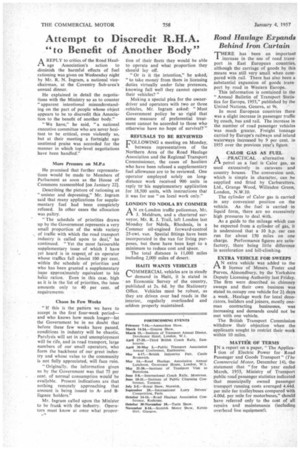Attempt to Discredit R.H.A.
Page 42

If you've noticed an error in this article please click here to report it so we can fix it.
"to Benefit of Another Body"
A REPLY to critics of the Road Haul I-1 age Association's action to diminish the harmful effects of fuel rationing was given on Wednesday night by Mr. R. N. Ingram, a national vicechairman, at the Coventry Sub-area's annual dinner.
He explained in detail the negotiations with the Ministry so as to counter "apparent intentional misunderstanding on the part of people whose object appears to be to discredit this Association to the benefit of another body."
"We have," he said, "a national executive committee who are never hesitant to be critical, even violently so, but at their meeting a fortnight ago unstinted praise was accorded for the manner in which top-level negotiations have been handled."
More Pressure on M.P.s
He promised that further representations would be made to Members of Parliament as soon as the House of Commons reassembled [on January 22].
Describing the picture of rationing as "sinister and depressing," Mr. Ingram said that many applications for supplementary fuel had been completely refused. In other cases the allocation was paltry.
"The schedule of priorities drawn up by the Government represents a very small proportion of the wide variety of traffic with which the road transport industry is called upon to deal," he continued. "Yet the most favourable supplementary issue of which 1 have yet heard is in respect of an operator whose traffics fall almost 100 per cent. within the schedule of priorities and who has been granted a supplementary issue approximately equivalent to his ba'sic ration. Even in this case, high as it is in the list of priorities, the issue amounts only to 40 per cent, of requirements.
Chaos In Few Weeks "If this is the pattern we have to accept in the first four-week period and who knows how much longer—let the Government be in no doubt that before these few weeks have passed, conditions in industry will be chaotic. Paralysis will set in and unemployment will be rife, and in road transport, large numbers of our small operators, who form the backbone of our great industry and whose value to the community is not fully appreciated, will face ruin.
"Originally, the information given us by the Government was that 75 per cent, of normal consumption would be available. Present indications are that nothing remotely approaching that amount is being issued to Aand Blicence holders."
Mr. Ingram called upon the Minister to be frank with the industry. Operators must know at once what propos ," tion of their fleets they would be able to operate and what proportion they should lay off.
"Or is it the intention," he asked, "to take money from them in licensing duties virtually under false pretences, knowing full well they cannot operate their vehicles? "
Making a special plea for the ownerdriver and operators with two or three -vehicles, Mr. Ingram asked: "Must Government policy be so rigid that some measure of preferential treatment cannot be accorded to those who otherwise have no hope of survival?"
REFUSALS TO BE REVIEWED rOLLOWING a meeting on Monday, I between representatives of the Northern Area of the Road Haulage Association and the Regional Transport Commissioner, the cases of hauliers who have been refused a supplementary fuel allowance are to be reviewed. One operator employed solely on longdistance work received 900 units in reply tohis supplementary application for 18,500 units, with instructions that it was for use "on local work only."
LONDON TO NDOLA BY COMMER
AN ex-London traffic policeman, Mr. J. Meldrum, and a chartered surveyor, Mr. R. J. Trail, left London last Monday for Ndoia, Rhodesia, in a Commer oil-engined forward-control 25-cwt. van. Special fittings have been incorporated in the van for living purposes, hut these have been kept to a minimum to reduce cost and space.
The total distance is 11,000 miles including 2,000 miles of desert.
HAITI WANTS VEHICLES rOMMERCIAL vehicles are in steady
demand in Haiti, it is stated in an Economic Survey of the country, published at 2s. 6d. by the Stationery Office. Vehicles must be robust, as they are driven over bad roads in the interior, regularly overloaded and seldom properly maintained.








































































































